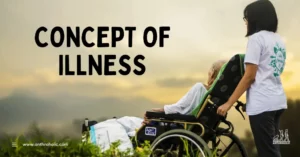AI Answer Evaluation Platform Live Now. Try Free Answer Evaluation Now
Medical Anthropology
Medical anthropology can be defined as a distinct subfield of anthropology that merges biological and social perspectives in understanding health, illness, and healing across diverse cultures and over time. This field incorporates an all-encompassing approach, delving into areas such as the cultural interpretations of health and illness, the study of medical systems (both biomedicine and traditional), the impact of socio-political dynamics on health outcomes, and the role of healing practices within societies [1].

Medical anthropologists strive to provide a comprehensive understanding of the ways in which cultural, social, and biological factors intersect, playing a significant role in health and illness experiences across the globe. The ultimate objective is to utilize these insights in order to influence policy, inform public health strategies, and drive interventions.
Historical Overview
The emergence of medical anthropology as a distinct discipline can be traced back to the early 20th century. However, it only gained substantial recognition in the mid to late 20th century, particularly during the 1960s and 1970s. Early work primarily focused on ‘exotic’ non-western societies, with anthropologists such as George Foster and W.H.R. Rivers documenting indigenous medical systems. As the field evolved, it began to incorporate critical theories, feminist perspectives, and post-colonial discourses, thereby broadening its theoretical horizons and contributing to a more nuanced understanding of health and healing in diverse settings [2].
A case in point is the seminal work of Paul Farmer, who demonstrated how health outcomes, particularly in resource-poor settings, are deeply influenced by economic, political, and structural forces [3].
Connection with Other Disciplines
Medical anthropology, by its nature, is an interdisciplinary field. It bridges the gap between the social sciences and the biomedical sciences, thereby facilitating a holistic understanding of health and illness. The field converges with sociology, psychology, public health, and even history, among others. For instance, Arthur Kleinman’s work on ‘illness narratives’ represents a blend of medical anthropology and psychiatry, elucidating the culturally and personally constructed experience of illness [4].
To conclude, medical anthropology provides a comprehensive lens through which to understand the manifold dimensions of health, disease, and healing. Its interdisciplinary approach, theoretical depth, and methodological versatility make it an indispensable field in contemporary anthropology and global health.
Theoretical Frameworks in Medical Anthropology
Medical anthropology adopts multiple theoretical frameworks to elucidate the complex nature of health, illness, and healing. These theoretical lenses provide a means to understand biological, socio-cultural, and political-economic aspects of health-related phenomena across diverse societies. This article explores three major theoretical perspectives in medical anthropology: ecological/evolutionary, interpretive, and critical medical anthropology.
Ecological/Evolutionary Perspectives
The ecological/evolutionary perspective in medical anthropology draws upon the principles of biology and ecology to elucidate patterns of health and illness. This perspective considers the evolutionary roots of disease and how environmental factors influence health outcomes. It highlights the adaptive nature of human responses to environmental stressors, including disease and illness [5].
For instance, studies on lactose intolerance illustrate the interaction between cultural practices, genetics, and environment. The spread of dairy farming led to a genetic adaptation in some populations for lactose tolerance, highlighting the evolutionary aspect of dietary practices and its consequent health implications.
Interpretive Perspectives
The interpretive perspective in medical anthropology focuses on understanding health, illness, and healing practices through the lens of culture. This perspective contends that illness is not just a biological condition but a socially constructed phenomenon imbued with cultural meanings. Therefore, to fully comprehend health and illness, one must decipher the cultural symbols and meanings associated with them.
Arthur Kleinman’s work exemplifies this perspective. His studies on ‘illness narratives’ emphasize that the experience of illness is shaped by the cultural and personal meanings attributed to it [4].
Critical Medical Anthropology
Critical medical anthropology (CMA) is a theoretical framework that seeks to understand health and illness within the larger social, economic, and political contexts. CMA argues that health disparities are a result of structural and systemic inequalities and thus must be analyzed in relation to power, politics, and economics [1].
A classic example of CMA is Paul Farmer’s work on structural violence. Farmer elucidated how political, economic, and social structures exacerbate health disparities, using the HIV/AIDS epidemic in Haiti as an illustrative case [3].
In conclusion, the theoretical frameworks in medical anthropology provide varied, yet interconnected, lenses to understand health and illness. These frameworks, whether focusing on the ecological, interpretive, or critical aspects, emphasize the complex interplay of biology, culture, and structure in shaping health outcomes.
Understanding Illness and Disease
Disease Etiologies
Disease etiologies in medical anthropology refer to cultural explanations and understandings of the origins and causes of illnesses and diseases. Different societies have various interpretations of etiologies, which are often deeply rooted in their socio-cultural, religious, and historical contexts. Anthropologists study these diverse understandings to capture the broader picture of health and illness within specific cultures.
For instance, in certain African cultures, the etiology of diseases can be attributed to ancestral displeasure or witchcraft, which fundamentally influences their health-seeking behaviors and treatment choices [6].
Biological vs Cultural Aspects of Disease
Medical anthropology underscores the interplay between biological and cultural aspects of disease. While the biological aspect relates to the pathophysiological mechanisms causing diseases, the cultural aspect encompasses people’s understanding, interpretations, and responses to these diseases.
A classic example of this is tuberculosis (TB). While the biomedical explanation for TB is the infection by Mycobacterium tuberculosis, cultural factors such as stigma and socio-economic conditions significantly influence the spread of the disease and the patient’s health-seeking behavior [7].
Concepts of Health, Illness, and Disease in Different Societies
The perceptions and experiences of health, illness, and disease vary markedly across societies, often reflecting their cultural, social, and historical contexts. These concepts are not static but evolve over time, influenced by changes in socio-economic conditions, technological advancements, and increasing globalization.
For example, the Ayurvedic system of medicine in India perceives health as a balance of bodily humors, and disease arises from an imbalance of these humors. In contrast, biomedicine, dominant in Western societies, views health as the absence of disease and focuses on disease management at a largely physical and biological level.
By exploring these diverse perspectives, medical anthropology contributes to a more nuanced, comprehensive understanding of health and illness, underscoring the need for culturally sensitive healthcare approaches.
Medical Systems and Ethnomedicine
Medical systems around the globe, despite their vast heterogeneity, share the common goal of restoring and maintaining health. These systems represent a confluence of knowledge, practices, and beliefs that are intricately woven into the cultural tapestry of societies. Broadly, they can be categorized into formalized, professional systems such as biomedicine, and informal, localized systems often referred to as ethnomedicine. These systems, while distinct, frequently intersect and interact, offering a rich area of study for medical anthropologists.
Classification and Characteristics of Different Medical Systems
Medical systems can be broadly classified into two types: the professional (or formal) and the folk (or informal) medical systems. Professional medical systems, such as biomedicine (Western medicine), are codified and institutionalized, characterized by formally trained practitioners, systematic body of knowledge, and established institutions [8].
In contrast, folk medical systems, often referred to as ethnomedicine, are local, culturally specific systems. These are usually characterized by their reliance on community healers who have not undergone formal medical training and use treatments based on local resources and traditional knowledge [8].
An illustrative example is the difference between biomedicine and Ayurveda, a traditional Indian medical system. While biomedicine is grounded in empirical evidence and biological mechanisms, Ayurveda is rooted in centuries-old philosophies and seeks to balance the body’s humors to achieve wellness.
Ethnomedical Practices and Practitioners
Ethnomedical practices are the traditional healing methods used in different cultural contexts, based on the unique beliefs and customs of each community. These practices might involve the use of herbs, rituals, diet adjustments, spiritual healing, among others [9].
The practitioners of ethnomedicine, often known as traditional healers, play crucial roles in their communities. They serve as the mediators between the spiritual and physical realms, diagnose and treat illnesses, and provide social and psychological support. An example can be the shamans in many indigenous cultures who diagnose and treat illnesses through spiritual journeys and the use of sacred plants.
Biomedicine as a Cultural System
Although biomedicine is often perceived as a universal, objective medical system, from an anthropological perspective, it is considered a cultural system. It is shaped by Western ideologies of the body, health, and illness, and its practices are deeply embedded in the social, economic, and political contexts of Western societies [10].
An example is the biomedical model’s emphasis on the mechanistic understanding of the body, which reflects Western society’s broader cultural values of individualism and mechanization.
In conclusion, medical anthropology’s exploration of different medical systems and ethnomedicine provides invaluable insights into the diversity and complexity of health beliefs and practices across cultures.
Health, Healing, and Community
Health and healing are not merely personal, individualistic experiences, but they are deeply interwoven with the community fabric that surrounds us. In the realm of medical anthropology, the community’s role is of paramount importance, whether it’s in promoting health, offering healing, or sometimes even impeding health outcomes. Community shapes our understanding of health, our behaviors, and our interactions with various health systems.
Community Health Initiatives and Their Outcomes
Community health initiatives play a crucial role in improving the health and wellbeing of community members. These initiatives could range from public health campaigns, health education programs, and preventive screenings, to more complex interventions addressing social determinants of health like housing, education, and food security [11].
The outcomes of these initiatives often reflect the socio-cultural context in which they are implemented. For instance, the success of the guinea worm eradication program in sub-Saharan Africa can be attributed not just to the provision of filters but also to the active involvement of community leaders and the tailoring of the intervention to suit local customs and beliefs [12].
Role of the Community in Promoting or Impeding Health
Communities can play both a protective and a detrimental role in the health outcomes of their members. On the one hand, strong community ties, mutual support, and shared norms can promote healthful behaviors, improve access to healthcare resources, and provide a safety net during health crises.
Conversely, communities can also impede health through practices harmful to health, propagation of misinformation, or by perpetuating stigma and discrimination that prevent individuals from seeking care. For instance, in certain societies, the stigma associated with HIV/AIDS has hampered public health efforts to control the disease.
The Social Network and Its Influence on Health
The impact of social networks on health is increasingly being recognized. Social networks can influence health behaviors, mediate access to resources, and offer social support, thus playing a crucial role in health outcomes [13]. For example, social networks have been shown to play a significant role in smoking cessation, with individuals more likely to quit if they are part of a network where others have also quit.
In summary, understanding health and healing from the community perspective offers a richer, more nuanced insight into the complex interplay of socio-cultural factors that shape health outcomes.
Global Health and Medical Anthropology
The interconnectedness of today’s world brings health challenges that transcend national boundaries and require a global response. Global health, a field that aims to improve health and achieve health equity for all people worldwide, often intersects with medical anthropology. Medical anthropology contributes critical insights into global health by probing beneath surface-level health data to reveal the intricate web of socio-cultural factors that influence health outcomes on a global scale.
Role of Medical Anthropology in Global Health
Medical anthropology plays a pivotal role in global health by bringing a human-centered approach to health issues that are often regarded solely from an epidemiological or medical viewpoint. Anthropologists provide a deeper understanding of how cultural beliefs, social structures, economic systems, and political dynamics influence health and healthcare. For instance, anthropologists have highlighted the role of socio-economic inequalities in driving the global HIV/AIDS pandemic.
Moreover, medical anthropologists contribute to designing culturally sensitive interventions and policies that are more likely to be accepted and effective in local communities. The successful campaign against Ebola in West Africa exemplifies how anthropological insights into local funeral customs contributed to more effective control measures.
Ethnographic Studies of Global Health Interventions
Ethnographic studies, with their in-depth, localized observations, offer valuable insights into the dynamics of global health interventions. They can reveal the gap between policy intentions and actual outcomes, often highlighting the unforeseen consequences of well-intentioned interventions.
For instance, ethnographic studies in Nepal revealed how a global health initiative to incentivize institutional childbirth ended up contributing to strained health services and sometimes even detrimental health outcomes due to the systemic lack of readiness to accommodate increased demand [14].
Critical Perspectives on Global Health Policies
Critical medical anthropology provides a crucial lens to interrogate global health policies, often revealing power dynamics, structural violence, and inherent biases that can perpetuate health inequities. For instance, it has critiqued the trend of “medicalization” of global health issues, arguing that this approach often overlooks social determinants of health and can lead to an over-emphasis on technical solutions at the cost of broader social interventions.
In conclusion, medical anthropology and global health are inextricably intertwined, each enriching the other to develop a more comprehensive, holistic, and just approach to health worldwide.
Ethics in Medical Anthropology
Medical anthropology, with its often intimate encounters with human vulnerability, is deeply intertwined with ethical considerations. Ethical issues in this field arise not only in terms of research ethics but also extend to the very application and practice of medicine, healthcare delivery, and policy implementation.
Ethical Considerations in Health-related Research
Ethics in health-related research is a paramount concern for medical anthropologists, requiring rigorous examination and continuous vigilance. Key aspects include obtaining informed consent, ensuring confidentiality, avoiding harm, and striving for benefit to the community. It’s also essential to consider the power dynamics between researchers and participants, and to guard against exploitation.
One example of this ethical dilemma can be seen in research with indigenous communities, which has been historically marred by exploitative practices. Medical anthropologists are now increasingly cognizant of the need for a more equitable research relationship, including respect for indigenous knowledge and ensuring benefits for the communities involved [15].
Informed Consent and Confidentiality
Informed consent and confidentiality are fundamental to ethical research in medical anthropology. Consent is not merely a form to be signed but an ongoing, interactive process of informing, discussing, and negotiating with research participants (Jentsch, 2004). Issues may arise, for example, in contexts where the concept of individual autonomy differs significantly from Western notions, challenging the conventional approach to obtaining informed consent.
Confidentiality too is crucial, particularly given the sensitive nature of health information. Yet, maintaining confidentiality can sometimes conflict with other ethical considerations such as the duty to report child abuse or communicable diseases, creating ethical dilemmas.
Ethical Dilemmas in Medical Practice and Healthcare Delivery
Medical anthropologists also grapple with ethical issues arising from medical practice and healthcare delivery. For instance, anthropologists have shed light on the ethical quandaries faced by healthcare providers in resource-poor settings, where they often have to make agonizing choices due to scarcity of resources.
Furthermore, anthropologists have critiqued global health initiatives for sometimes imposing Western biomedical norms without considering local cultural contexts, raising ethical questions about cultural imperialism and the right to health autonomy [16].
In summary, ethics in medical anthropology is a vast and complex field, necessitating careful consideration at every level, from research design and conduct to the implications of medical practice and policy.
Conclusion
Medical anthropology takes us beyond a simplistic biomedical view of health and illness, advocating for a more holistic perspective that respects and integrates various medical systems and ethnomedical practices. From the consideration of theoretical frameworks such as ecological/evolutionary perspectives, interpretive perspectives, and critical medical anthropology, we gain a better understanding of the inherent complexities of health-related phenomena.
The examination of community roles in health and healing, and the importance of social networks, highlights the communal and social nature of health, challenging the individualistic focus often seen in mainstream health discourses. In the realm of global health, medical anthropology stresses the need for culturally sensitive, contextually relevant, and ethically conducted health interventions.
Our discussion on ethics underlines the necessity of maintaining high ethical standards in health-related research, taking into consideration informed consent, confidentiality, and other ethical dilemmas inherent in medical practice and healthcare delivery.
In conclusion, medical anthropology, as a multidisciplinary field, underscores the necessity of culturally informed, socially sensitive, and ethically sound approaches to health and healthcare. It reinforces the notion that health is not merely the absence of disease but a holistic state of well-being that involves the individual, the community, and the larger sociocultural context. As such, medical anthropology holds significant implications for improving healthcare delivery, policy-making, and our broader understanding of what it means to be healthy.
FAQs about Medical Anthropology
See Also
References:
1. Singer, M., & Baer, H. (1995). Critical Medical Anthropology. Baywood Publishing.
2. Lock, M., & Nguyen, V.-K. (2010). An Anthropology of Biomedicine. Wiley-Blackwell.
3. Farmer, P. (1999). Infections and Inequalities: The Modern Plagues. University of California Press.
4. Kleinman, A. (1988). The Illness Narratives: Suffering, Healing, and the Human Condition. Basic Books.
5. Armelagos, G. J., Brown, P. J., & Turner, B. (2005). Evolutionary, historical and political economic perspectives on health and disease. Social Science & Medicine, 61(4), 755-765. https://pubmed.ncbi.nlm.nih.gov/15950089/
6. Evans-Pritchard, E. E. (1937). Witchcraft, Oracles, and Magic Among the Azande. Clarendon Press.
7. Farmer, P. (1997). Social Scientists and the New Tuberculosis. Social Science & Medicine, 44(3), 347-358.
8. Foster, G. M. (1976). Disease Etiologies in Non-Western Medical Systems. American Anthropologist, 78(4), 773-782.
9. Helman, C. G. (2007). Culture, Health and Illness, Fifth edition. Hodder Arnold.
10. Lock, M., & Nguyen, V.-K. (2010). An Anthropology of Biomedicine. Wiley-Blackwell.
11. LeCompte, M. D., & Schensul, J. J. (2013). Designing and conducting ethnographic research: An introduction (Vol. 1). Rowman Altamira.
12. Hopkins, D. R., Ruiz-Tiben, E., Eberhard, M. L., & Roy, S. L. (2008). Progress toward global eradication of dracunculiasis, January 2007-June 2008. Morbidity and Mortality Weekly Report, 57(40), 1109-1112.
13. Berkman, L. F., Glass, T., Brissette, I., & Seeman, T. E. (2000). From social integration to health: Durkheim in the new millennium. Social Science & Medicine, 51(6), 843-857.
14. Adams, V., et al. (2008). The dominant discourse on medical pluralism in the tropics: Youthful reflections on the social science-NGO divide. PLoS ONE, 3(3), e1691.
15. Flicker, S., et al. (2007). Ethical dilemmas in community-based participatory research: Recommendations for institutional review boards. Journal of Urban Health, 84(4), 478-493.
16. Singer, M., & Benoit, C. (2017). Critical medical anthropology: A voice for biocultural and political-economic integration in health theory and practice. Critique of Anthropology, 37(1), 84-103.




